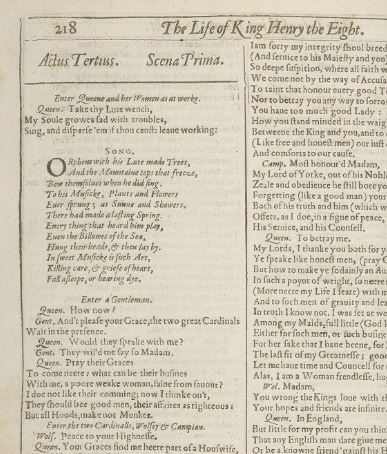
Charles Bordes wrote in 1883 a mélodie entitled Madrigal à la musique on a poem by Maurice Bouchor. It is a translation of the poem by Shakespeare (some say John Fletcher) in the play Henry VIII (act III, scene i) :
Orpheus with his Lute made Trees,
And the Mountaine tops that freeze,
Bow themselues when he did sing.
To his Musicke, Plants and Flowers
Euer sprung; as Sunne and Showers,
There had made a lasting Spring.
Euery thing that heard him play,
Euen the Billowes of the Sea,
Hung their heads, & then lay by.
In sweet Musicke is such Art,
Killing care, & griefe of heart,
Fall asleepe, or hearing dye.
You will find on the Internet various musical versions of this poem. Can we suggest this one ?
The singer is unknown to me. The music was written by Vaughan Williams in 1902.
Charles Bordes's mélodie, in E major, written twenty years earlier, is for four voices, soprano, mezzo-soprano, tenor and bass. For the time being there is no recording of it. The image of the tamed sea (lines 8 and 9) struck Charles Bordes. He remembered it in 1890 when he began his opera Les trois vagues (The three waves), unfortunately left unfinished. In this Basque legend a sailor subdues the three waves, of milk, of tears and of blood made by a sorceress to kill him.
Maurice Bouchor also translated into French Shakespeare's Tempest, published in 1888. A possible vision of this play is that of a victory of good over evil, thanks, precisely, to the elements.
We chose this text to open the blog, in february 2011. The post can be seen if you click here.
Maybe you have read the following post in English: Charles Bordes. Famous French Composer… The quoted text, by Jamie Farris, contains many untruths. It was put on this blog two years ago. If your return to it, read carefully the notes. Do you find them too allusive or humorous? Their purpose is to put things right.
Finally, to conclude this post, can we send you back here? You will find a twelve-line poem by Gavin Ewart. It has nothing to do directly with Charles Bordes, except that the cat-lover he was would have liked it and perhaps also the mélodie written and sung by David W. Solomons.


